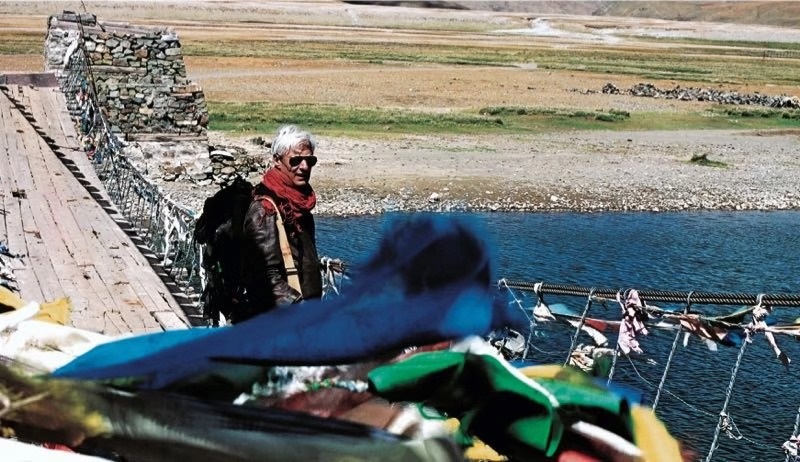China Reform and Opening – Forty Years in Perspective Editor's note: Laurence Brahm, first came to China as a fresh university exchange student from the US in 1981 and he has spent much of the past three and a half decades living and working in the country. He has been a lawyer, a writer, and now he is Founding Director of Himalayan Consensus and a Senior International Fellow at the Center for China and Globalization.
He has captured his own story and the nation's journey in China Reform and Opening – Forty Years in Perspective. China Daily is running a series of articles every Thursday starting from May 24 that reveal the changes that have taken place in the country in the past four decades. Starting this month, China Daily will run two articles from this series each week – on Tuesday and Thursday. Keep track of the story by following us.

The search for Shangri-La had begun. [Photo provided to chinadaily.com.cn]
Beijing spring, jasmine flowers were awakening. The ever-ebullient Zhao Qizheng, China's news and information minister, summoned me to his office. Now my advice was not being sought on how to lure foreign investment, but on how to restructure China’s media sector.
It was 2002 and China was embarking on a fiscal spending program. Zhu wanted to create domestic consumption to counter reliance on exports. That meant developing China's interior, not only focusing on the coastal cities.
Infrastructure investment would "open the west", Zhao said, "just as America opened its west too!"
"Now, how can we use media to positively influence investment into China's western regions?" he asked. I thought about it for a moment. "Just let Chinese travel, visit China's western regions, and make their own judgment. It is really much more effective, believe me. There is a Chinese saying 'to lure the tiger out of the mountain'. It was one of the ancient 36 strategies. Just intrigue visitors to take a trip and see for themselves. If China's media can just do this, it's a huge step."
Zhao nodded. He seemed to agree. He was excited, talking about China's policies of opening the western areas to multi-tiered investment, "First state investments in infrastructure, then Chinese private investment to enjoy the benefits of the infrastructure, then foreign investment to enjoy the wealth of China's private sector. Accumulatively it will raise standards of living for all the minority people, and create a super consumption market for China’s coastal products!"
I knew that China could successfully roll out such a program. I also feared that this could have negative effects on the environment and disrupt century-old traditions and ways of life that actually protect the environment.
"We should address this issue as well." Zhao nodded. He then turned to me, "But how?"
Then an idea occurred. "I remember when first traveling to Lhasa in 1992. Every afternoon I would join the pilgrims at Jokhang Monastery, the most important religious site in Lhasa after the Potala Palace. People would congregate in the plaza before the monastery, prayer wheels whirling, prostrating. The sun at that time of the day in Tibet is particularly strong. Shadows stretch long before the eyes. After hanging out in the square, I went to a tea house and drank lots of tea. The air was so dry. It was a very relaxing moment, just a feeling of calm at the end of each day. Returning to Beijing, I have not enjoyed that kind of calm since. If you can convey this feeling in a travelogue documentary, accompanied by a travelogue book, without mixing any politics or forcing any ideas on the viewer or reader, you will have people wanting to visit this place and see it for themselves."
"Great idea!" exclaimed Zhao. "I like this approach."
"Ok," I tested Zhao’s tolerance. "If you give me authorization to film and write a book that is just a travelogue, then I will hitchhike across China's remote western regions – followed by a documentary crew – and create a new image for China's west. Something like America's west in the 1970s, think Hotel California by the Eagles. I want to call it 'Searching for Shangri-La'. Will you agree, and grant me this permission? If so, I will deliver to you the coolest documentary that China has ever produced."
Zhao contemplated. "I trust you," he confided. "You have always given me good constructive advice. In the past, it always worked. I can arrange all the permissions."
I was stunned, never expecting this answer. It came without any expectation. The search for Shangri-La had begun.
|






7740f3b5-9ecb-438e-9052-76cb2d4bb671.jpg)

